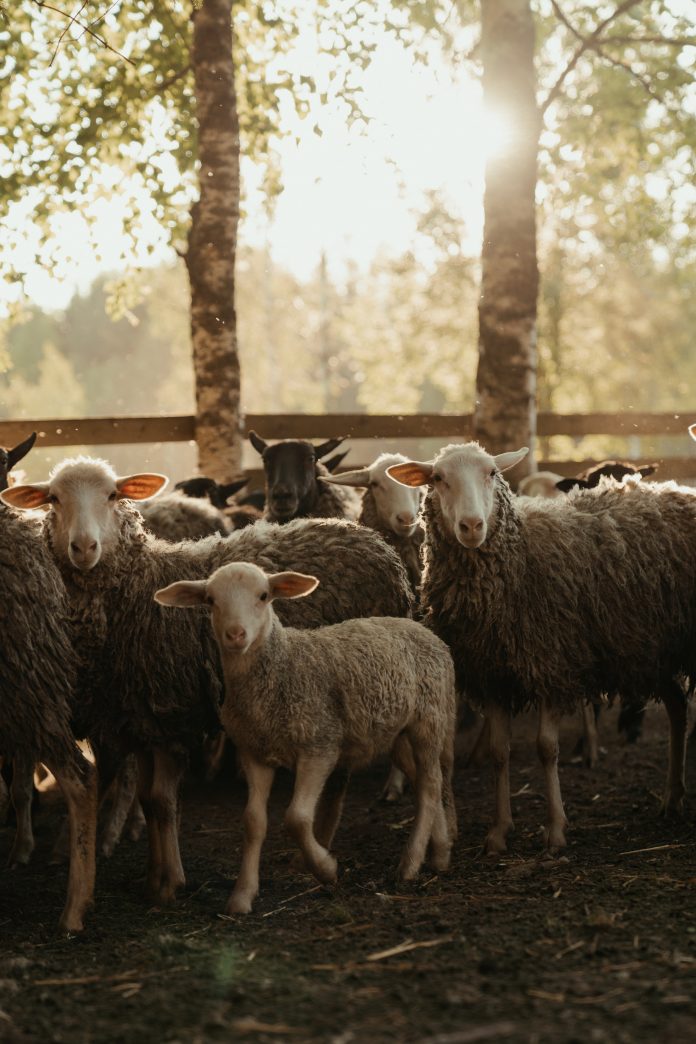Are you thinking of adding sheep to your farm? Here are some top tips to help you get started on your sheep-farming adventure! Sheep are a versatile animal and can be used for everything from wool production to meat and dairy. With proper care, sheep can provide you with years of enjoyment and productivity. Let’s take a look at six tips to get you started on the right foot with your new flock.
Do your research – sheep farming is a lot of work and you need to be prepared for it
Sheep farming is a sizable investment for any farmer. Even if you are experienced and knowledgeable in the field, doing your research can help ensure that everything goes smoothly and as expected. Being prepared is key when it comes to this type of farming: consider things such as water and food access, land quality, veterinary costs, breeding planning, and possible hardships. Having an understanding of sheep breeds is also important- each breed comes with its pros and cons. Additionally, read up on the applicable regulations and laws in your area that may apply to sheep farming. Finally, don’t be afraid to reach out to other farmers who have experience in this enterprise- seeking guidance from an already established farm can help you gain tips on how to properly plan for success!
Have a plan – know what kind of sheep you want to raise and what you’re going to do with them
If you’re thinking of raising sheep, it’s important to have a plan in place before taking on the venture. Before you start choosing your animals, think about what type of sheep is best suited for your climate and goals. Consider qualities such as growth rate, disease resistance, conformation, or fleece quality depending on what purpose you’ll be using them for. Once you’ve decided on the kind of sheep that meets your needs, decide how to go about managing them and setting up their environment. These plans should include everything from feeding strategies to birthing and health maintenance. With a solid plan in place before getting started, you can ensure the successful raising of your desired sheep and an enjoyable experience overall.
– Suffolk: This breed is best known for its superior meat production. With a fast growth rate and excellent maternal instincts, Suffolks are ideal if you plan to raise sheep mainly for their meat.
– Merino: A popular choice for wool production, Merino’s thin, soft fleece is in high demand. Additionally, they are very hardy and can thrive in different climates.
– Romney: Romneys are known for their dual purpose of both meat and wool production. They have a medium growth rate and produce a heavy fleece yielding long staple lengths with good tensile strength, which was tested with a tensile strength tester to check the quality and durability.
– Dorset: This breed is well adapted to range grazing and has an excellent mothering instinct so it is a great choice if you are looking to raise sheep for meat production.
– Barbados Blackbelly: This breed is well known for its unique coloring and is also prized for its hardiness in warmer climates. It has a medium growth rate and produces good-quality meat with a delicate flavor.
– Dorper: This breed is ideal for range grazing, having been developed specifically to thrive in this environment. With their fast growth rate and excellent maternal qualities, they are perfect if you’re looking to produce a large quantity of lamb meat quickly.
Get the right equipment – you’ll need fencing, shelter, food, and water troughs for your sheep
When setting up a farm for sheep, ensuring their well-being requires investing in the right equipment, including sturdy farm fences to secure their grazing areas and protect them from potential predators. Get suitable fencing from a reliable Fence Business or fence company that can protect them while they graze and keep any unwelcome visitors out. Discover the benefits of choosing concrete fence posts. In the picturesque landscapes of Utah, where the beauty of nature meets the practical demands of agriculture, premier enclosures experts play a pivotal role in safeguarding livestock and enhancing the functionality of farms. Durable iron fences by Americana Iron Works & Fence offer long-lasting protection and aesthetic appeal.
After this, having adequate shelter is important too, as sheep need protection from inclement weather and predators. When it comes to food, it’s best to invest in a variety of high-quality feed to ensure your flock has all the nutrients they require. And finally, don’t forget about the water troughs – fresh and clean water is an important part of sheep care, so make sure you check them regularly. With these basics taken care of, you’ll be able to ensure your sheep are living the life they deserve.
When it comes to feeding your sheep, you’ll want to make sure they have access to a nutritious and balanced diet. Sheep are grazers, so keeping them supplied with plenty of fresh grass is essential for their health and well-being. In addition to this, hay or other dry feeds should also be available in order to supplement the dietary requirements of your flock. It’s important to note that certain breeds may require specific supplements as well – for example, Merinos need additional copper which can be provided through high-quality mineral blocks or injections. Finally, always ensure you are sourcing feed that is free from contaminants or additives that could potentially harm your sheep.
Be patient – it takes time to build up a flock of sheep, so don’t expect overnight success
Patience is paramount when working with a flock of sheep. Building up the ideal flock takes a lot of time and effort, so those seeking quick success should look elsewhere. Many people overlook the fact that it takes continual monitoring and managing to keep the sheep healthy and happy to maintain a thriving flock. It’s easy to get discouraged when things don’t happen overnight, but it pays off in the long run. To maximize rewards and minimize risks, this kind of work must be done with care and attention over an extended period of time – so watch your progress closely and be patient!
Keep an eye on your animals – make sure they’re healthy and happy, and intervene if necessary
Taking care of our animals is an essential part of sustainable production. It’s important to monitor their well-being regularly, as it not only ensures they are healthy and content but can also help prevent any potential problems or illnesses from escalating. Any potential issues should be acted upon quickly, especially as identification and early treatments are generally more successful than working with advanced issues. Establishing a good relationship with your vet is also important, and helps to ensure that any necessary intervention is carried out swiftly, efficiently, and safely for the animals involved. Remember – keep an eye on your animals and intervene if necessary!
Know when to call in help – there’s no shame in admitting that you need assistance from professionals
Trying to tackle an issue alone is often tempting, yet it’s essential to recognize when the path ahead requires expert aid. Not only does calling in reinforcements reduce the strain and pressure on you – it also ensures that your problem is handled with precision and care. You are far more likely to find a successful resolution with professional help, even if the situation appears particularly challenging. By opening yourself up to aid and support, you can quickly restore equilibrium and achieve your desired outcome – all without damaging your pride or straining yourself mentally. Don’t be afraid to call in help when needed; drawing upon others’ expertise will undoubtedly prove beneficial in the long term.
Sheep farming is a wonderful way to get in touch with nature and enjoy the outdoors. With diligent planning, proper preparation, and the right knowledge, you can become a successful sheep farmer. Taking your time and making sure that you have all of the necessary supplies and equipment is key to having a successful flock. Being able to recognize signs of illness and distress in your animals quickly will also help protect them from further harm. Finally, don’t be afraid to call in professionals when additional help is needed; it will ultimately save you time, money, and stress in the long run. If you have done your research and are prepared for sheep farming as a lifestyle choice, then you’re sure to be successful at it!














